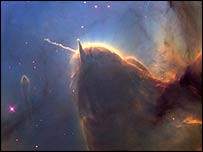A new theory proposes that our star and its planetary system were born in a nebula, filled with short-lived, massive stars that exploded with immense energy and an intense release of radiation.
The evidence? A primitive space rock which contains signs that a short-lived, radioactive form of the element chlorine may have been present in the early Solar System. A US-Chinese team, whose findings appear in Proceedings of the National Academy of Sciences, claims the most likely source of this isotope was a supernova.
To this point in time, astronomers have believed that the Solar System formed inconspicuously, from a slowly condensing cloud of dust and gas--a view that is now being challenged.


No comments:
Post a Comment
Note: Only a member of this blog may post a comment.